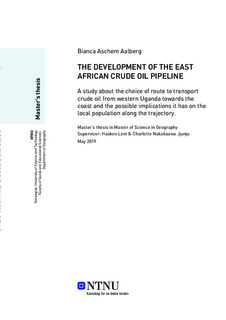| dc.description.abstract | I 2006 ble det funnet olje i Albertine Graben-området i Vest-Uganda. Dette startet en prosess der Uganda, sammen med de internasjonale oljeselskapene Total SA, Tullow og Chinese National Offshore Oil Corporation, forsøkte å finne en rute for transport av oljen til kysten for eksport. Tre mulige ruter ble identifisert, og i august 2015 ga Uganda en uttalelse om at de hadde bestemt seg for at oljerørledningen skulle gå gjennom Kenya. I april 2016 kom det en ny uttalelse der myndighetene i Uganda annonserte at den skulle bygges gjennom Tanzania i stedet. De rundt 15 000 menneskene som bor langs den foreslåtte ruten i Uganda og Tanzania må flytte som en konsekvens av konstruksjonen av oljerørledningen, enten permanent eller midlertidig.
Gjennom en kvalitativ tilnærming med intervjuer og dokumentanalyse, har denne oppgaven identifisert hvilke interessenter og faktorer som bidro til den endelige avgjørelsen av ruten til oljerørledningen, og hvilke konsekvenser dette kan ha for menneskene langs ruten. Hovedfaktorene som bidro til den endelige avgjørelsen var prisen på oljerørledningen, den satte tariffen, trusselen om terrorangrep fra Al Shabaab, miljøpåvirkning og områdenes grunneiere. Konsekvensene for innbyggerne som bor langs ruten er økonomisk baserte. Beboerne kan ikke dyrke avlinger på taksert land og kan ikke fiske i Lake Albert i nærheten av oljeinstallasjonene. Disse konsekvensene påvirker både inntekt og matforsyning. Den ugandiske regjeringen ønsker å endre artikkel 26 i grunnloven som gir folket retten til kompensasjon før oppkjøp av land. Hvis artikkelen blir endret, kan dette få konsekvenser for de lokale innbyggerne, som ikke vil bli kompensert før flyttingen er ferdig, i tillegg til at de må flytte ut av området. Ugandas kompliserte juridiske pluralistiske system med flere typer landsystemer gjør også kompensasjonsprosessen vanskelig, med rapporter om inkonsekvent betaling. Et fond opprettet for mange år siden for å finansiere flyttingen, er tømt på grunn av korrupsjon. | |
| dc.description.abstract | In 2006, commercially viable oil deposits were found in the Albertine Graben area in western Uganda. This started a process where the government of Uganda, together with international oil companies Total SA, Tullow and Chinese National Offshore Oil Corporation, aimed to find a route to transport the oil to the coast for export. Three routes posed as an option to transport the oil, and in August 2015, Uganda issued a statement that they had decided on a route through Kenya. In April 2016, a new statement was published, where the government of Uganda said that the crude oil pipeline would be constructed through Tanzania instead. Approximately 15 000 people live along the projected path in Uganda and Tanzania, who will have to move due to the construction of the pipeline, either on a permanent or temporary basis.
Through a qualitative approach, with interviews and document analysis, this thesis has identified which stakeholders and factors contributed to the final decision of the route of the crude oil pipeline, and which consequences this might have for the population along the trajectory. The main factors which contributed to the final decision was the price of the pipeline, the set tariff, the threat of terrorist attacks from Al Shabaab, environmental impact and land tenures. The consequences for the inhabitants who live along the trajectory is founded on financial struggles. The inhabitants cannot grow crops on appraised land and cannot fish in Lake Albert near the oil installations. These consequences affect both income and food supply. The Ugandan government wants to amend Article 26 of the Constitution which gives the people the right to compensation before land acquisition. If the article is amended, it is identified as a possible consequence for the local inhabitants, who will not be compensated until after the relocation process is finished, while they have to move out of the area. Uganda’s complicated legal pluralist system with several types of tenures also makes the compensation phase difficult, with reported inconsistencies in payment. The Ugandan Land Fund, which was established many years ago to finance the relocation, is empty due to corruption. | |
